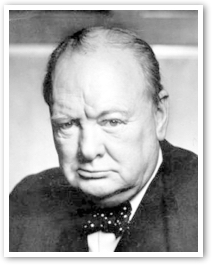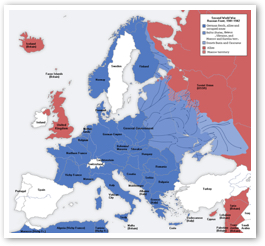"Never Give In" – What We Can Still Learn From Winston Churchill
- TOD WORNER
It was a homecoming. Of sorts.
 He had been there only a year before. Had it even been that recent, British Prime Minister Winston Churchill wondered? Yes. Yes. It had been, but it seemed a lifetime ago. His last visit to his alma mater, Harrow, was during the chill of December, 1940 after the blackest of falls. Having ruthlessly dispatched with most of Western Europe in the matter of weeks, the Nazi war machine had unleashed its fury on the recalcitrant island nation of Great Britain. The whine of diving fighters and the pound of impacting bombs came night after night, month after month. Submit! Demanded the raging Fuhrer. Submit or become ash. It wasn't even a year ago.
He had been there only a year before. Had it even been that recent, British Prime Minister Winston Churchill wondered? Yes. Yes. It had been, but it seemed a lifetime ago. His last visit to his alma mater, Harrow, was during the chill of December, 1940 after the blackest of falls. Having ruthlessly dispatched with most of Western Europe in the matter of weeks, the Nazi war machine had unleashed its fury on the recalcitrant island nation of Great Britain. The whine of diving fighters and the pound of impacting bombs came night after night, month after month. Submit! Demanded the raging Fuhrer. Submit or become ash. It wasn't even a year ago.
It wasn't even a year ago that Churchill had arrived at his old schoolhouse to the fanfare of starry-eyed students beholding their leader, their lion. With his wife and a small band of friends and assistants, Churchill fell back into the romance of his boyish days gone by. In short order, a song from Harrow alum E.E. Bowen titled Giants was raucously sung,
There were wonderful giants of old, you know, There were wonderful giants of old;
They grew more mightily, all of a row, Than ever was heard or told;
All of them stood their six feet four,
And they threw to a hundred yards or more, And never were lame or stiff or sore;
And we, compared to the days of yore,
Are cast in a pigmy mould.
For all of we,
Whoever we be,
Come short of the giants of old, you see.
As was E.W. Howson's Boy!
When my evening fire is gilding
Picture, table, wall and chair;
Dreamily I fall a-building
Fairy castles in the air.
Haste, the swelling note is knelling! Who can disobey the call? All my cherished hopes have perished, All the fairy castles fall!
Troubles that beset and bore me
Melt away to left and right,
And the future crowds before me,
Thick with visions of delight.
And as fancy grows prophetic
I anticipate the hour,
When I soar by feats athletic
To the shining ranks of power.
Yes. It had been nearly one year. And now, in October, 1941, so much had changed.
The Battle of Britain was effectively over. The Blitz of London was past. Cities laid to waste were rebuilding. The dead were buried and mourners collected themselves to carry on with great pain, but greater resolution. Operation Sea Lion, the Nazi plan to invade and subjugate Great Britain, had been eclipsed by Operation Barbarossa, the Nazi's ruthless drive to murder their way deep into the Soviet Union. The United States offered desperately needed financial and material support, but remained officially uninvolved.
And while the immediate crisis had passed, the Russians had become allies and the Americans were increasingly sympathetic, the Nazi terror continued to spread. Churchill's map review would prove disconcerting in 1941,

Nazi Europe (blue), 1941-42
And while destruction and loss remained pervasive and indiscriminate, the jowly bulldog Churchill was fixed in his message. As he gathered himself up and leveled his gaze at the boys and men before him, he was resolved. It was a message to inspire maturing schoolboys. But, even more, it was a call to a nation. And a reminder to himself.
Winston Churchill, fierce and proud, stood before a gleaming generation, the very future of his country and urged,
"We must learn to be equally good at what is short and sharp and what is long and tough."
"We must [as Rudyard Kipling said] '…meet with Triumph and Disaster. And treat those two impostors just the same.' You cannot tell from appearances how things will go. Sometimes imagination makes things out far worse than they are; yet without imagination not much can be done."
"Surely from this period of ten months this is the lesson: never give in, never give in, never, never, never-in nothing, great or small, large or petty — never give in except to convictions of honour and good sense. Never yield to force; never yield to the apparently overwhelming might of the enemy. We stood all alone a year ago, and to many countries it seemed that our account was closed, we were finished. All this tradition of ours, our songs, our School history, this part of the history of this country, were gone and finished and liquidated. Very different is the mood today.
Britain, other nations thought, had drawn a sponge across her slate. But instead our country stood in the gap. There was no flinching and no thought of giving in; and by what seemed almost a miracle to those outside these Islands, though we ourselves never doubted it, we now find ourselves in a position where I say that we can be sure that we have only to persevere to conquer."
We have been enshrouded in darkness, but we are coming to the light, Churchill implied. Though others tottered and fell, we remained steadfast, resolute, true. And yet, even Churchill would not endorse the notion of darkness. Instead, he corrected,
"Do not let us speak of darker days: let us speak rather of sterner days. These are not dark days; these are great days — the greatest days our country has ever lived; and we must all thank God that we have been allowed, each of us according to our stations, to play a part in making these days memorable in the history of our [people]."
Seventy-four years ago (this month) Winston Churchill spoke to these boys. And to his nation. And to us. Dark days are great days.
And we are called to greatness by rightfully, courageously and honorably standing firm in the face of evil. We are called to be determined and resolute.
Never give in, never give in. Never. Never. Never.
 This is J. Fraser Field, Founder of CERC. I hope you appreciated this piece. We curate these articles especially for believers like you.
This is J. Fraser Field, Founder of CERC. I hope you appreciated this piece. We curate these articles especially for believers like you.
Please show your appreciation by making a $3 donation. CERC is entirely reader supported.

Acknowledgement
Tod Worner. ""Never Give In" – What We Can Still Learn From Winston Churchill." A Catholic Thinker (October 8, 2015).
Reprinted with permission from the author, Tod Worner.


